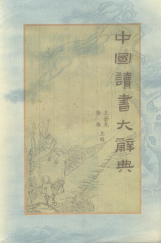中国读书大辞典
王余光、徐雁主编。南京大学出版社1993年5月出版。收词4000余条,内容涉及历代读书掌故逸闻和读书人物史迹,古今中外的读书理论与方法、读书名言名著的鉴赏,珍贵的导读书目和推荐书目,名人读书生活和书斋,有关的图书知识、读书报刊和读书活动等,并有1000种精选的名著导读。书前设“条目分类详表”和“正文部类概目”。书末附“条目音序索引”。

主要责任者: 王余光,徐雁
责任方式: 主编
出版者: 南京大学出版社
出版地: 南京
字数: 1894 千字
页码: 1-1474
开本: 32
装帧: 精
语种:中
定价:48.00
出版时间:1999-07
丛书多卷书否:否
书目简介:本册工具书共收录3729条词条。
被引频次:289